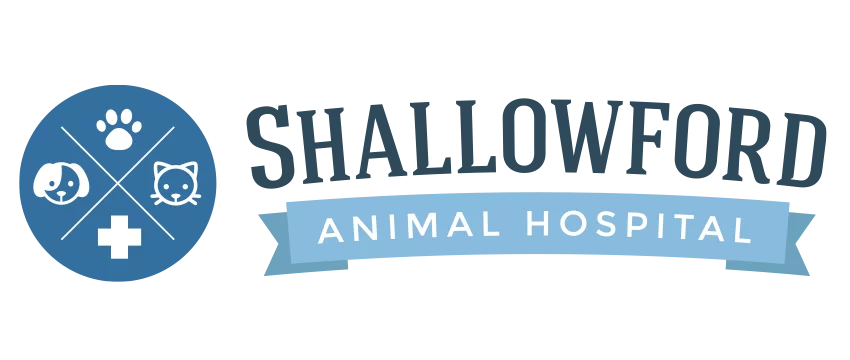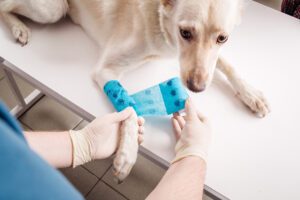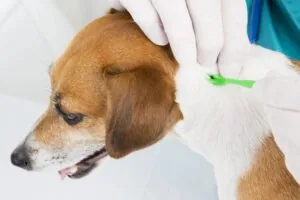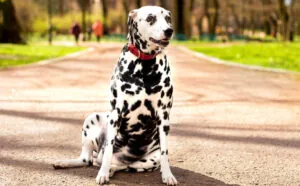Bloat in Dogs: Symptoms and Treatment
Bloat, also called Gastric Dilation Volvulus (GDV), is a serious and life threatening condition in dogs. Although this condition can range in severity, it most often requires emergency surgery and veterinary care to save the dog’s life.
The main symptoms of bloat in dogs involve signs of pain and gastrointestinal distress. Some dogs with bloat may also start to show signs of shock when their condition is either very severe or has been left untreated.
Here we will be explaining everything that dog owners need to know about bloat, or GDV, in dogs. This will include the symptoms of bloat in dogs and how the condition is diagnosed and treated by a vet. Additionally, we will be answering some of the other most commonly asked questions about bloat in dogs. Let’s get into it.

What Is Bloat?
Bloat is a condition that can occur in dogs when their stomach gets cut off from the body’s blood supply. In severe cases the stomach can also get flipped and folded on itself, leading to the halt of digestion as well. The abdomen gets cut off from blood flow as the stomach fills up with an abnormally high amount of gas.
How Do Dogs Get Bloat?
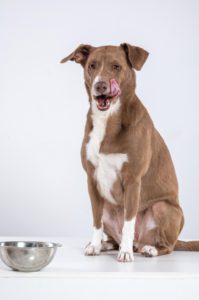
There are several different ways that dogs can develop bloat. Most of the time this condition occurs when dogs eat too quickly or exercise just before or after eating their meals. Older and larger dogs are at a higher risk of developing bloat, with dogs that are over 100 pounds being the most at risk. Deep chested dogs like Bulldogs and Boxers are at an elevated risk for developing this condition as well.
Similarly, there have also been links between genetics and bloat. This means that a dog with a parent that has once been diagnosed with bloat are more likely to experience the condition themselves. Dogs eating a poor quality dog food that contains a high amount of fats, oils, and fillers are statistically more likely to develop bloat as well.
Although there are many risk factors associated with bloat, any dog of any breed or size could potentially develop it. This is why knowing the symptoms of bloat and how you can prevent this condition in dogs is so important.
How Common Is Bloat In Dogs?
Unfortunately, bloat is a fairly common medical emergency in dogs. However, taking some precautions to prevent bloat can reduce your dog’s chances of developing this condition.
What Are The Symptoms Of Bloat In Dogs?
Bloat is a condition that shows some pretty serious symptoms in dogs, and these symptoms tend to progress quickly. Here are some of the symptoms of GDV that dog owners should be aware of and look out for:
- Retching – with or without actually vomiting. Vomit in dogs with bloat will usually appear as a white or yellow foamy substance
- Have a bloated stomach
- No longer eating or drinking
- No longer defecating
- Showing signs of anxiety and restless behaviors (pacing, circling, etc.)
- Excessive panting
- Excessive drooling
- An increased heart rate
- An increased breathing rate
- Having very pale white or gray gums
- Collapse
In addition to the above symptoms dogs with bloat will often show signs of having severe abdominal pain. Here are some signs of abdominal pain in dogs with bloat:
- Whining when their stomach is touched
- Running away and hiding when their stomach is touched
- Guarding their stomach
- Reacting aggressively when their stomach is touched (biting, growling, etc.)
- Sitting or laying in abnormal positions where their front side of their body in lower than their backside
How Is Bloat In Dogs Diagnosed?
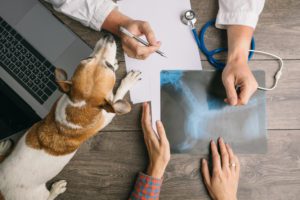
Most of the time, bloat is diagnosed by a vet through physical examination and an X-Ray of the dog’s abdomen. This is because the symptoms of bloat are pretty easy to spot for veterinarians, and X-Rays will confirm the diagnosis as well as show how severe the condition of bloat is. Some vets may also call for blood tests that will help examine the overall health of your dog at that time, especially if they are showing signs of shock.
How Is Bloat In Dogs Treated?
In most cases, GDV in dogs requires emergency veterinary attention and surgery. Before going into surgery, vets will start working on treating signs of shock with IV fluids. The vet will likely attempt to move gas out of the abdomen before surgery if it is possible, and they will also likely give the dog pain medication to keep them as comfortable as they can.
The next step to saving a dog with bloat is emergency surgery. This surgery involves untwisting the dog’s stomach and spleen when necessary. From there the vet will also extract any parts of the digestive system that have died as a result of the condition. Most veterinarians will also stitch the stomach to the abdominal wall, preventing further cases of bloat in the future.
Can Dogs Survive Bloat?
Yes, dogs can survive bloat when seen by an emergency vet immediately. Generally, the prognosis for dogs with bloat is about a 50 percent fatality rate among all cases. Out of cases that get treated quickly, only ⅔ of dogs survive. This means that the current average number of dogs that perish from bloat after receiving prompt treatment is around one in every three dogs.
How Can You Prevent Bloat In Dogs?
The best way to prevent bloat in your dog is to not exercise them before or after eating. This will allow your dog to properly digest their food while also preventing bloat. Similarly, using a slow feeding bowl when feeding your dog can help prevent bloat in dogs that eat their food very quickly. Slow feeders prevent a dog from developing excess gas as a result of very fast eating, which also prevents bloat.
Conclusion
The thought of your pup getting bloat can be scary. However, it is your duty as a dog parent to know how to prevent and treat bloat if it does ever happen. If you have any further questions about GDV bloat in dogs, reach out to your veterinarian.
For dog parents in the Lewisville, NC region, Shallowford Animal Hospital is here to treat your pet. Give us a call at (336) 945-4412 or visit us online!
Share This Post
Recent Posts
About Shallowford Animal Hospital
Shallowford Animal Hospital and The Pet Spa at Shallowford are dedicated to the exceptional, compassionate care your pet deserves. Pets hold a very special place in our families, and we treat yours like our own.
